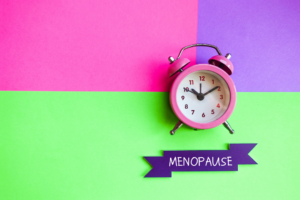Menopause in the Workplace

With Spain’s new menstrual leave policy, Tesco’s workplace menopause guide and women everywhere coming forward about their menopause experiences, it’s time organisations caught up.
Women, transgender, intersex, and non-binary people who menstruate will all go through menopause at some point in their lives.
Typically, this starts in the mid-40s and 50s. But menopause can be early (before the age of 45) or premature (before the age of 40) for several reasons – such as natural ovarian failure, surgically-induced, as a side effect of medical treatment (e.g. some breast cancers) or as a complication of other issues e.g. ectopic pregnancy.
Many suffer symptoms during ‘perimenopause’ (the problematic precursor to the ‘full’ menopause). During this time, symptoms come and go without warning. Periods can become unpredictable, heavier, more painful, longer, and more debilitating before they disappear altogether during menopause.
Menopause symptoms can be extremely debilitating, making it hard to carry on with day-to-day life. Commonly known symptoms include hot flashes, chills, sleep changes, problems with memory and concentration, low mood, anxiety, and headaches.
Less well-known are symptoms like heart palpitations, hair loss, frequent UTIs, joint stiffness and soreness, and bone brittleness that can lead to osteoporosis.
Not everyone gets severe symptoms; some may find they can continue on more or less as normal. Others face a much longer process of swinging between extreme symptoms and experiencing dramatic changes to their mind, body, and health.
Despite how many people are affected by menopause, there’s very little research about it. Many younger women admit they know very little about menopause, and people who don’t go through it likely know even less. As we recently explored on our podcast with Katie Ridge, around 8% of those affected end up leaving the workplace as a result of ‘women’s health issues.
With so many symptoms, but so little legislation to protect people going through menopause, many people suffer in silence. The stigma around menopause also means important conversations aren’t happening, and those with symptoms can struggle to get help.
Taking a sick day when you have the flu or asking to cancel a meeting when you have a sore throat feels justified. Yet, despite how disruptive and debilitating menopause symptoms can be, many people would feel uncomfortable asking for the same support in light of their symptoms. And, as previous case studies have shown, employers would fail to recognise the impact of menopause either.

What Makes It An Organisational Issue
Perimenopause and menopause symptoms can last between 4-12 years, which means there’ll likely be a considerable proportion of your workforce suffering from symptoms at any given time. Some people experience symptoms for decades.
Research has shown a 1-2% reduction in employment rates for every psychological symptom – things like anxiety, depression, and irritability – associated with menopause. That percentage rises to 2-4% when symptoms are particularly bothersome.
Physical symptoms – like hot flushes and night sweats – were only linked to lower employment rates where individuals reported them as bothersome.
What this suggests is that organisations do not have adequate structures in place to support the mental health of people suffering from menopausal symptoms. What’s more, psychological and physical symptoms can have a knock-on impact on confidence, with those suffering feeling less confident about their abilities, and more inclined to stop working. As a result, women in their 40s and 50s could receive fewer promotions, or be unable to develop their careers further.
Women who experience early menopause go on to lose four months of employment during their early 50s. Since the psychological symptoms can be so detrimental to the overall experience of work and willingness to stay, having structures and support in place for people who go through menopause could not be more important.
While Ireland and many other Western countries lack specific legislation around menopause in the workplace, individuals can experience discrimination on the grounds of disability, gender, and age.
The Employment Equality Acts (1998-2015) prohibit discriminatory treatment of employees because of their gender or sex. When menopause symptoms are treated differently from other medical conditions, this could be ruled as discrimination.
What’s more, indirect discrimination can occur when employer policies or ways of working put women with menopause at a disadvantage (unless their treatment can be objectively justified).
Back in 2015, an example of direct sex discrimination and unfair dismissal came to light in the UK case of Merchant v BT PLC 2012. Ms Merchant was dismissed on the grounds of poor performance. But her employer had failed to take her menopausal symptoms into account, despite the fact she had given them a letter from her GP outlining her impaired concentration.
Unfortunately, in this case, her employer made stereotypical assumptions based on the experience of his wife and colleague. The tribunal pointed out that the manager would never have adopted “this bizarre and irrational approach with other non-female-related conditions”, or treated a man suffering from ill health with comparable symptoms in the same way.
Because menopause typically affects menstruating people in their 50s, employers who fail to create policies that account for menopause symptoms also risk age discrimination against their people. In essence, policies and systems that do not account for menopause could be contributing to the gender pay gap; where women and minorities find themselves out of work due to their symptoms.
What Should Employers Be Doing
Conversations about menopause aren’t always easy to have, but they’re vitally important. Leaders should be discussing how to make their organisation more supportive and respectful of people experiencing perimenopause and menopause. And those conversations should result in actions and policies that are actively enforced.
People going through menopause might not want to approach their line manager or boss to talk about it, but making sure they know there’s someone available and open to those conversations can be extremely useful if they do decide they want to talk.
You could assign a well-being person who’s readily available for those chats, and easy to access for all members of staff. Making sure they have a quiet, uninterrupted space (if you use a workplace), or a flexible calendar where individuals can book some time will help make organising those conversations more straightforward. Anything that removes or prevents barriers to those conversations is a step in the right direction.
Of course, for people to know they can talk about menopause and seek help too, they need to know your organisational stance on it. Having policies in place – like menstrual leave, flexible working, or even a space in your office building to step away from the hustle and bustle – and talking about them openly could make people feel more comfortable about the topic.
Positive messaging and frequent conversations help to normalise menopause symptoms and experiences. Including menopause in your policies and conversations about mental health and culture will help you build a more inclusive organisation too.
Many people might be tempted to work through bad symptoms, especially since more of us are working remotely. They might feel guilty for taking a day off when they’re already working in their home, but these acts of presenteeism can be detrimental to their health, their feelings towards work, and their ability to work.
Validating an employee’s symptoms will help them feel supported and respected. Framing menopause as you would any other physical health issue encourages those suffering from symptoms to speak out and ask for the adjustments they need. In return, they’ll probably feel more able to continue working and create an environment that works for them.
Small adjustments can make the biggest difference. For example, if someone is suffering particularly badly with hot flushes, ensuring uniforms are made from breathable fabric can make those symptoms more bearable. Where sleep patterns are disrupted, having staggered start times or flexible hours allows people to adjust their start times in line with their energy levels.
Menopause can present so many challenges for people suffering from symptoms. However employers have an opportunity to ease some of this burden by creating room for conversations, more inclusive policies, reasonable adjustments, and providing wellbeing support where it’s needed.
If you’re curious about how you can make your organisation a better place to work for people going through menopause, check out our latest podcast episode with Katie Ridge from Adare HRM.

